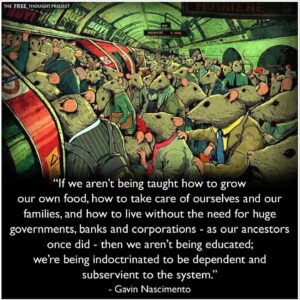My Algorithm is Blue
So I occasionally watch YouTube videos, and sometimes Facebook reels. I like TikTok. I don’t spend a LOT of time watching them, but once in a while it’s nice to just watch some short clips and call it a night. TikTok in particular has become highly amusing to me, since I managed to FINALLY get it to send me conservative humor (see my post from Feb. 5).
See, my feed is blue. It’s REALLY blue. Some of this is because I still read/listen to/watch Left leaning stuff because I report on it to you guys. Frankly, most of it is because I’m poly, pagan, kinky, and pansexual. There’s this assumption that if you’re any ONE of those, you must be Liberal. To be all four? The algorithm thinks I’m so deep Left it’s impossible to think. So it sends me Leftist crap constantly.
It’s not just one place. I get it in my news, because I actively seek out Left news for education’s sake. I get it in my Facebook because I get it in my news, and because some of my friends and acquaintances are Left. I get it in YouTube because it’s a Leftist hell hole. I get it in TikTok because that seems to be the initial basic setting, and you have to work to get out of it.
The main problem I have is that it isn’t just that “they” think I should be Left; it’s that certain facts about my person, physical things, seem to doom me to be “mistaken” for Left when I am not. As an example, we’ve all mentioned septum ring theory: the idea that if a person has a septum ring, they’re almost invariably likely to be Leftist. The same thing with blue hair. If you have both, you’re definitely a Leftist.
I don’t understand how hair color dictates politics. I’m offended by it. I have very far Right friends with septum rings and green hair. No one on our side cares. Any time someone with wildly colored hair or big tattoos or facial piercings “comes out” as Republican or Right leaning, the Left goes into complete melt down mode. I cannot even begin to tell you the number of times I was told that I couldn’t possibly exist on the Right because y’all would hate me and kick me out for being pan, poly, pagan, or kinky. Instead, I found there’s a vibrant LGB community here on the Right. A lot of poly people are conservative. Pagans are all over the damn place. Kinky is… yeah, well anyhow. LOL… You get what I’m saying. The Right doesn’t care.
The Left wraps up their politics in their entire belief system, their personality, and their reality. Therein lies the biggest problem, really. It’s why you can’t talk logic with a lot of leftists. If you start to dig into any aspect of what they believe, they immediately take it as a personal attack. They believe, 110%, that you are attacking them, the person. They cannot comprehend the concept that one can attack the ideal or the fact (or lack thereof) and not be the least bit upset about the person behind it.
The amount of time it takes to dismantle even one small part of the leftist’s worldview enough to show them that it’s faulty causes them to break. I don’t mean that figuratively, for most of them, either. It may seem stupid to you, but I want you to think about how you’d feel if you found incontrovertible truth, actual facts and photographs, proving Trump diddled little girls. You’d be shocked to your core, because the man you’ve known and loved doesn’t seem anything like that. It would mess with your world view and rock your core, because we’ve just KNOWN he’s not the bad person the Left paints him as. That’s how they feel, that depth of despair, every single time you pick at a bit of the Left’s beliefs. If you do manage to break it down into small enough pieces that they can understand it, and they accept it, it doesn’t break down the other parts of their worldview, because to do so would cause them irreparable harm.
When I watch videos of people on the Left being questioned by good speakers (Charlie, for instance, but also many others who are new journalist types), I see the answers get more and more vague as they go along. If you push too hard, they will actually change the conversation entirely, sometimes attacking in a random direction, just to make the questioning stop.
I don’t believe most of them do this out of spite. I believe it’s the response to the trauma they’re living. Having known people who’ve survived serious trauma, it’s a mental tactic most victims don’t even realize they’re doing. I see people on the Left acting much like the victims of domestic abuse and sexual abuse that I’ve known. They’ve been lied to for so long, and it’s just… it’s a lot more comfortable and less painful if you just acquiesce. Standing your ground hurts. And frankly, the human brain is not meant to endure long-standing pain. We’re built to avoid it.
Yes, there are agitators out there. We all know it. Sometimes we can pick them out, and other times, we have to wait for law enforcement to do it at a later date using videos and written statements from witnesses. There only need to be a tiny number of agitators, though. Two or three seeded through a large crowd can turn it into that mob in seconds. They create a flashpoint.
But “most people” are just that… they’re average, they’re the bulk of the people out there. When you press them, they cannot articulate why they’re protesting, or give you different methods to fix the problem. They just chant their slogans. It’s easier than losing their friends, family, and community. Or jobs. I know; I’ve been there. The big difference is, I’m an abuse survivor, and so I recognized (eventually) what was happening to me and how I was responding. I saw it was unhealthy, and I got out. Most people don’t have that experience (nor would I wish it on them). This is just “normal” to them. And since “everyone” is saying the same thing, it must be true.
And that takes me back to that statement I’ve made several times: Not every news station can be lying to me, all at the same time. From a logical standpoint, that is simply absurd. Except we know it isn’t. We know that they ARE lying to us, all of them. It’s tough.
I don’t have the answers. I wish I did. The only way to fix this stuff is to have people on the Left have an epiphany. That only comes when they’re challenged, and they’re avoiding those challenges because it’s hard. So they have no reason and no impetus to change.





 I don’t know who Elsa Kurt is, but this showed up yesterday afternoon on my feed, and I agree with it. It speaks better words than I can.
I don’t know who Elsa Kurt is, but this showed up yesterday afternoon on my feed, and I agree with it. It speaks better words than I can.

 There are *some* things wrong in the top part. There is nothing right about the bottom part. The temper tantrums being thrown are epic and ridiculous. This is what happens when you “gentle parent” your way through life.
There are *some* things wrong in the top part. There is nothing right about the bottom part. The temper tantrums being thrown are epic and ridiculous. This is what happens when you “gentle parent” your way through life.
 Truth hurts.
Truth hurts.